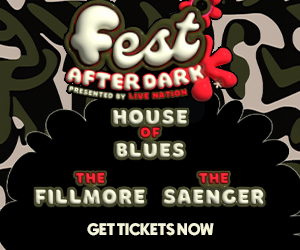Lead singer/guitarist (and current Cowboy Mouth member) John Thomas Griffith hits Rewind on one of New Orleans’ first punk artifacts, the Red Rockers’ 1981 debut.
“You could probably count on four hands the number of people interested in punk rock in New Orleans around 1980. One time we played a party on the West Bank and they paid us $100 to stop. But most of the punks were articulate and smart—it felt like sitting around in Paris with all the intellectuals quoting Camus, except it was the Sex Pistols and the Clash. And there were some good bands in town, like the Normals, the Skinnies, the Backstabbers. James [guitarist James Singletary] and I used to listen to John G., who played this stuff every week on WTUL, and we went to Leisure Landing on Magazine Street to look through the import records. That became our Holy Grail, to go there every week.
On Christmas Eve 1980, we piled all our stuff into a Ryder truck and moved to Los Angeles—all the New Orleans bands were going to New York, so we thought we’d be different. And our drummer Jeff Greenberg left the band on the way there. So there we are, standing on Sunset Boulevard with no drummer. We’d played some shows with X so I said, ‘Let’s call John Doe, maybe he knows someone we can use.’ So we called his house and the guy who answers the phone said ‘I play drums, what kind of music?’ I said we liked the Clash and Stiff Little Fingers and he said ‘I love that shit, come meet me at Vine and Hollywood.’ So that’s how Patrick (Butler Jones) joined the band. I hear his drumming and how fast we played, and I wonder what he was on. Then James reminds me, “Dude, we were all on speed.”
We recorded Condition Red in about five days. Howie Klein signed us to his 415 label and David Kahne was his staff producer. I was just screaming all the time, which is probably the worst thing a singer can do to his voice, but I grew up wanting to be a screamer like Roger Daltrey. On the recording there were no rules: At one point there’s a whirling kind of sound, which was somebody drilling upstairs; we recorded that and used it as the intro for ‘Hold On.’ David said ‘This will be great, nobody will even know what it is.’ Jello Biafra was someone else we befriended; he let us stay on his couch for two weeks. He sang on ‘Folsom Prison Blues’ and that was the extra cherry on top for the punk people. But all he really did was that ‘yippie-i-yay’ thing in the middle.
People thought we were communists because we did things like paint hammers and sickles on our amps, but we did that more for fun. It seemed to me that our songs were really about personal politics, seeing what was wrong in the world. We turned 18 and registered for Selective Service together, so that’s what ‘Dead Heroes’ is about, the feeling that you might have to go off and die somewhere. ‘Grow Up’ was [bassist] Darren Hill’s song, we all lived with our folks at the time. The title of ‘Teenage Underground’ came right from Generation X, another band we really loved. David Kahne was on us to write bridges and choruses and pay attention to hooks, so it was really like going to songwriting college.
We were on perpetual tour for two years, then Howie signed us to Columbia—I remember signing the contract on the back of a car, outside the Rose Tattoo near Tipitina’s. At that point we got serious about trying to write hit songs, that’s where a song like ‘China’ came from. And to be honest, we started wondering if we wanted to do that kind of hard-nosed touring for the rest of our lives. Right now it makes me tired just to think about it.”




